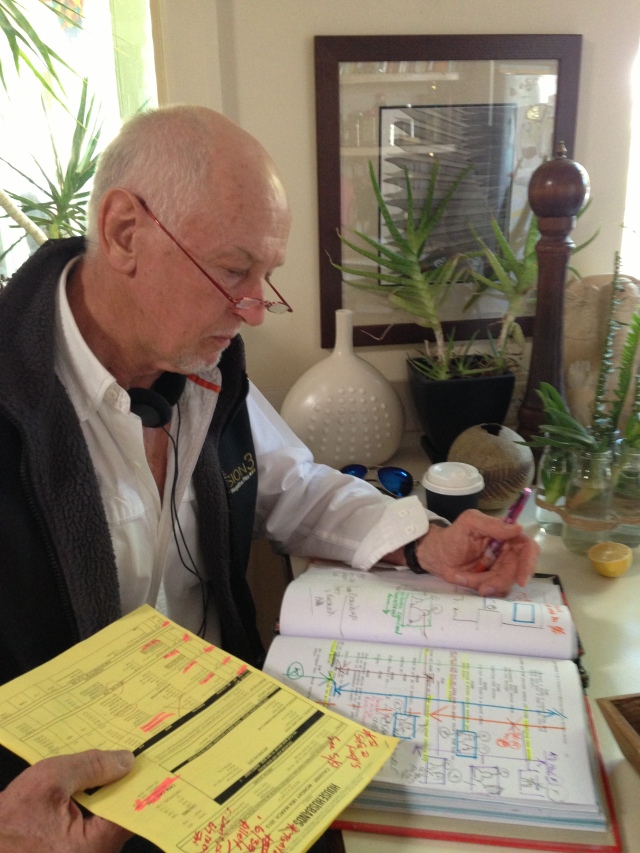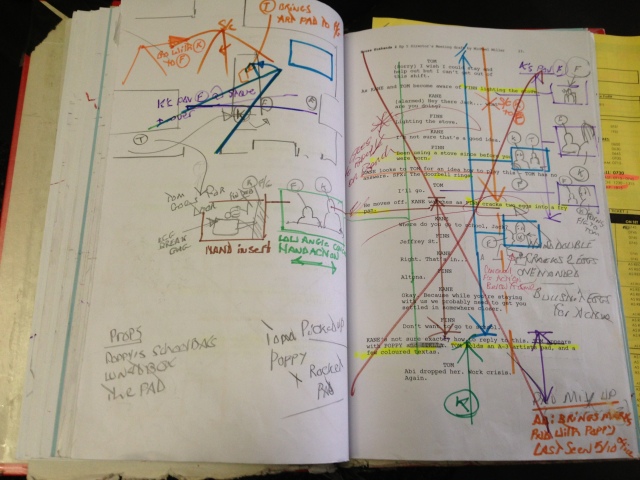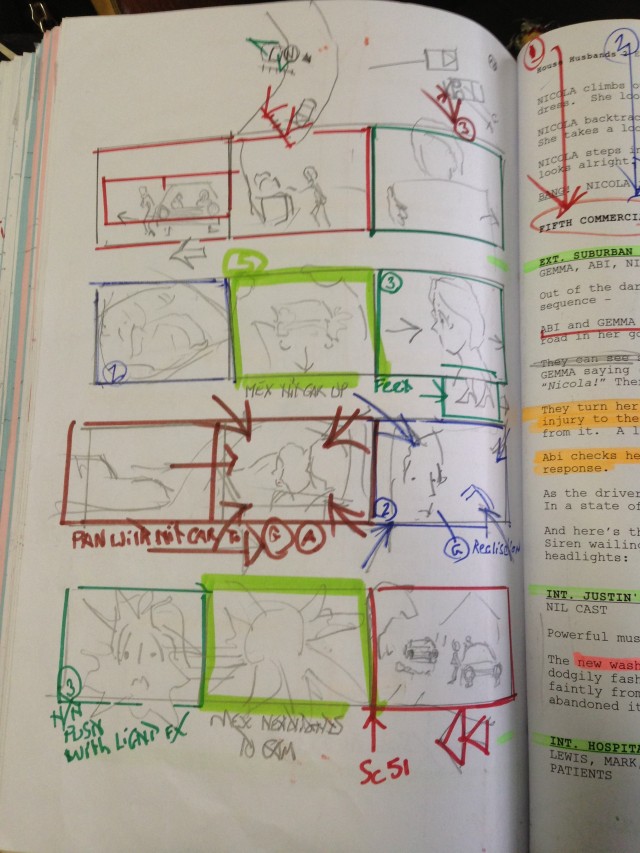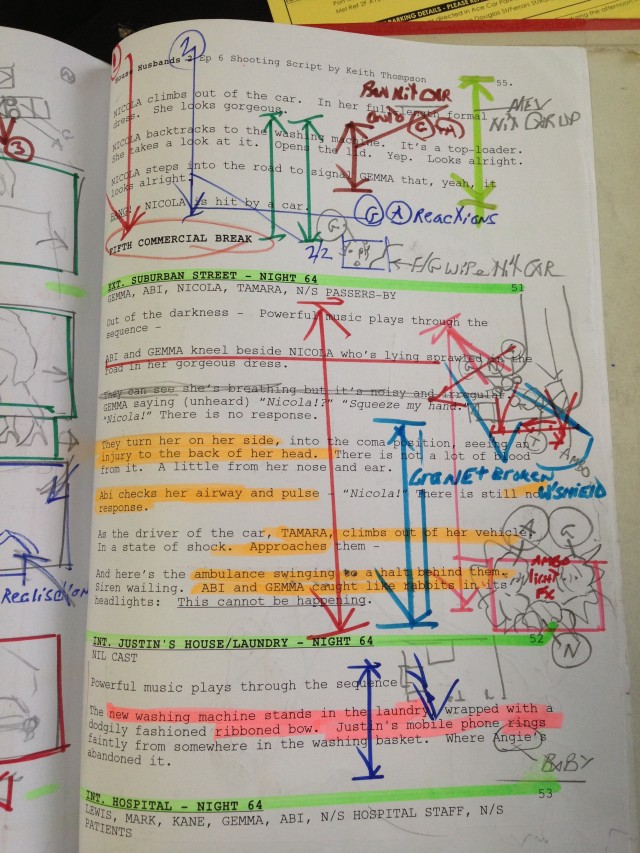I must have worked with over a hundred directors by now, with some of them on more than one project. Some are camera oriented, the shots are everything to them. Others concentrate a lot more on performance, they focus on their actors. Some are more inclined to let things happen naturally and only intervene when a scripted line or a camera angle is out of whack. Others want to be involved in all decisions that influence the set. Some stick to each comma in the script. Others can’t shoot a scene without changing a bit of big print action or a line. Various styles and methods and of course, various personalities!
On my last block on House Husbands I got to work with a director that was truly impressive! I mentioned in a previous post the really short preproduction time given on any tv shows. Maybe that’s why I have never met a director to do exactly what a directing class teaches. I’m not saying other directors don’t do their homework but Ian did his exemplarily! I’ve never seen another director more organised than him! His scripts at the beginning of the day looked like MY scripts at the end of the day. He highlighted each scene and marked them up with vertical lines. His facing pages had floor plans and colour coded camera angles. Here and there on the page there were sketches and storyboards, notes on performance and story. Just have a look!
He wrote these notes in preproduction. Whenever I asked how he wanted to block a scene and what it meant to him for the overall story, he’d start explaining with a ruler and colored markers, drawing floor plans, camera angles and quick sketches on his script.
For instance he’d say a scene was about two characters who chatted about other two so he was going to do a ‘walk and talk’ down the hallway of the house for the main part of the dialogue, then the characters would reach the lounge room on a specific line in the dialogue – a key line he’d mark in his script. Then, their reveal in full view to the other characters. He also had a thing about connecting characters in a scene. In this case by doing two wide shots from behind the two pairs once they were all facing each other. The reason being that intercutting separate two-shots was not in line with the tone of the scene, characters would just ‘see’ each other but he wanted them exposed and vulnerable so a wide shot from behind would express that vulnerability.
All these ideas he straight away wrote down, colour coded and marked up in his script, so on set he was very well prepared to clearly brief the crew on what he wanted.
This made everyone’s job on set so much easier, specially mine. I knew the exact scripted line he wanted his actors to stop at the end of the corridor – so no confusion with which take’s action to keep for coverage. Actors knew how to pace their dialogue during the walk and talk to hit their marks at the right time. I also knew when he wanted to cut so I only needed to focus on matching those specific actions. Everything else could be different, so more freedom for his actors to change their performance around those cutting points. It also helped production and camera with planning their time for coverage as he knew precisely how many setups he needed to cover a scene.
And even though he had visualised it all in pre, he was still incredibly flexible to our suggestions. That’s because he knew exactly what mattered in a scene, the story. It allowed him to be open minded and not cling onto preplanned shots. Whenever possible he combined setups, changed the block for better lighting or easier coverage. And even though his floor plans didn’t have shots that crossed the line, he allowed a camera angle from the other side to accommodate the style of the show.
His scripts are art works! What an amazing process!

Director Ian Barry on the set of House Husbands II






Hello, I am so glad I came over your post and thank you for the deed!
This is truly what I wonder about director’s breakdown of professional ones in the industry.
I am a student filmmaker in Vietnam, as you mentioned he did as what “the textbook told” I am quite overwhelmed since we don’t have a valid textbook or taught in a programmed syllabus, we learn from experience of teachers only. By so, would you mind sharing me the textbook’s title which gave these guidelines?
Really appreciate! Thanks a bunch ^^
It’s an awesome article for all the internet visitors;
they will get benefit from it I am sure.
Thanks it helps me alot….and shows what the main scripts looks like….thanks Q very much to this blog….
i’m not used to the new Yahoo! Pulse that comes with your email. i like blogging though…and i don’t know how to change the blog settings to make your posts invisible to everyone except you and stuff. help please DX.
I want to pursue a major in creative writing, and eventually become a fiction writer, but my question is, besides teaching english (which I NEVER picture myself doing), what is there for someone with a creative writing degree to do before they have written any books. My mom says a degree in creative writing is like signing up to work at Starbuck’s until i get published, is this the case?.
Hi there, I am trying to contact Ian Barry so that my son can interview him for their student newspaper. Ian went to the same school as my son, Balgowlah Boys HIgh. Would you be able to send his email details onto us please? Or if you could send our details to him we would greatly appreciate it. Kind Regards. Kathlyn
Thanks for your marvelous posting! I definitely enjoyed reading
it, you will be a great author.I will be sure to bookmark your
blog and definitely will come back sometime soon. I want to encourage
you continue your great job, have a nice weekend!
This is a very interesting post – thank you for sharing.
My interest is in how practitioners interact with a script and so I can see how the plain paper book functions as a very useful aid for directors when used in this way. As I’m interested in screenplay analysis and visualisation using software (see phd.tripos.biz and scenepad.com) I wonder if and how this kind of thing could be done within a screenwriting application – although the more I look at the example pages you provided the more convinced I am that paper works better! Do you have any thoughts or can you recommend any tools for me to look at that might do some of what Ian is doing?
I pay a quick visit each day some websites and blogs to read posts, but this website provides feature based writing.
I used to be suggested this web site through my cousin. I am
now not certain whether or not this put up is written by
him as nobody else realize such specific approximately my trouble.
You’re wonderful! Thanks!
Pingback: Research ‘How to be a ‘good’ director’ | 3rd Year Bloggity Type thing.
We stumbled over here different page and thought I might as well check things out.
I like what I see so now i’m following you. Look forward to looking over your web page yet again.
It’s about doing your home work and knowing what you want. He also has the experience to know what to do in the time you have. Did you find he was flexible enough to change when he couldn’t make it work ? Not in terms of blocking but once you had the shots going ?
Great read.
jb
When people know this well what they want, other HODs can start to enter the conversation on a completely different level and therefore engage in a extremely high quality collaboration.
If the other HODs not secretly are longing to be directors themselves, that is … 🙂